The year I was living and working in Ghana, my first year as a widow, I decided to get away for the New Year holiday and do nothing that smacked of tradition or the past; it would just be too painful. I decided to go to the most interesting, exotic, affordable place I could think of, somewhere I’d never been.
I chose the Sultanate of Oman on the Arabian Peninsula.
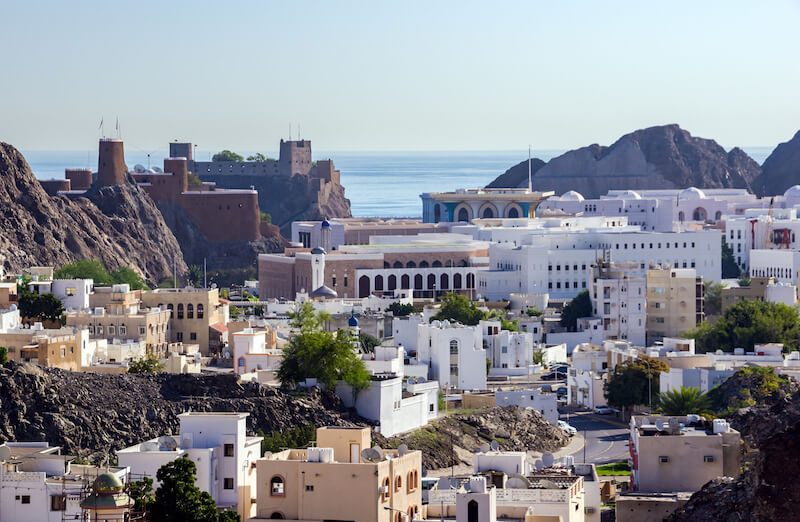
Oman is a beautiful and intoxicating country, with one coastline on the Oman Sea (across from Iran) and the other on the Arabian Sea. It has magnificent, bare, jagged rock mountains that surround the shore, spectacular snorkeling, exquisite deserts and wonderful wadis (riverbeds – sometimes dry, sometimes heavenly pools of water).
Oman’s history is ancient and its traditions strong yet it has a strong, Indian influence from the days of railroad building. Many people and establishments are Indian, and the “traditional” Omani dish is biryani, the popular mixed rice dish of Muslim Southern Asia.
Oman is a country for the senses – frankincense (everyone uses incense in the home), perfumes (the very expensive fragrance “Amouage” comes from Oman), date palms, textiles from all over the Orient, gold and silver jewelry, cities with stunning white architecture and lush parks, golden deserts, ancient forts, green phosphorescent surf from plankton, Bedouins (who live in houses, not tents), camels, and an amazing irrigation system known as falajas, winding, cement or stone-lined channels that use gravity to bring water down from mountain springs.

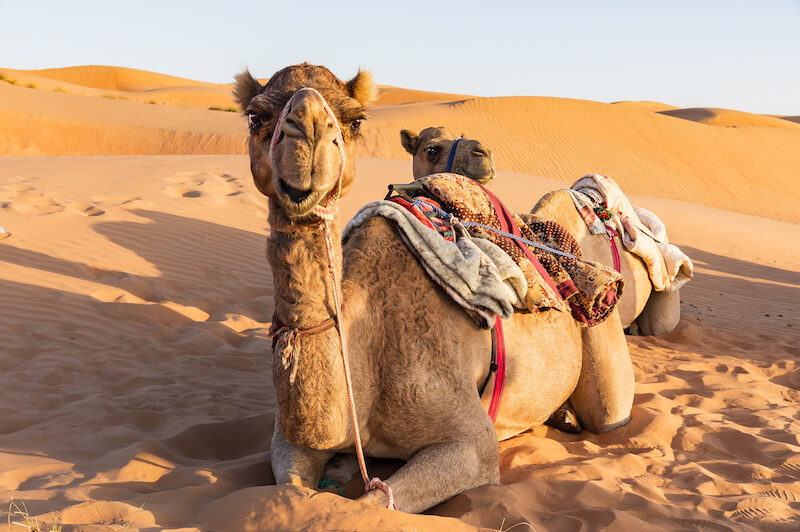
Oman is a Muslim country with mosques in every neighborhood and five times a day, the muezzin, or call to prayer, adds to the sensory experience. One of my taxi drivers stopped in mid-fare at a mosque for a prayer break while taking me from one town to another.
Like many hot, Muslim countries, everything closes for prayer time, between 12:15 and 4:30 p.m. and reopens until 7 or 8 p.m. This makes sense during the hottest seasons, but in “winter” it is far cooler and a big chunk of the day is lost.
The country has been ruled for 40 years by the same Sultan, whose principal home is an extraordinary turquoise and gold seaside palace. He has others, including one of the world’s largest yachts (one of several he owns). He seems to have succeeded in modernizing his country while retaining its cultural traditions.
Muscat, on the Oman Sea, is the capital city. It is extremely modern, clean, and quiet, and a ride along the Corniche east to the old town is another sensual delight.
There are numerous high-end hotels in Muscat, particularly in the expensive Madian Qaboos or Qurm neighborhoods. One needs to balance cost against convenience: I stayed in a modest hotel not far from the spectacular Sultan Qaboos Grand Mosque, but far enough from Old Muscat to cost me $60 my first day on taxi fares (get the best hotel deals in Oman with Booking.com). There are so many museums, mosques, palaces and things to do in Muscat (not to mention shopping in the souks) that I recommend staying closer to the Muttrah Souq.
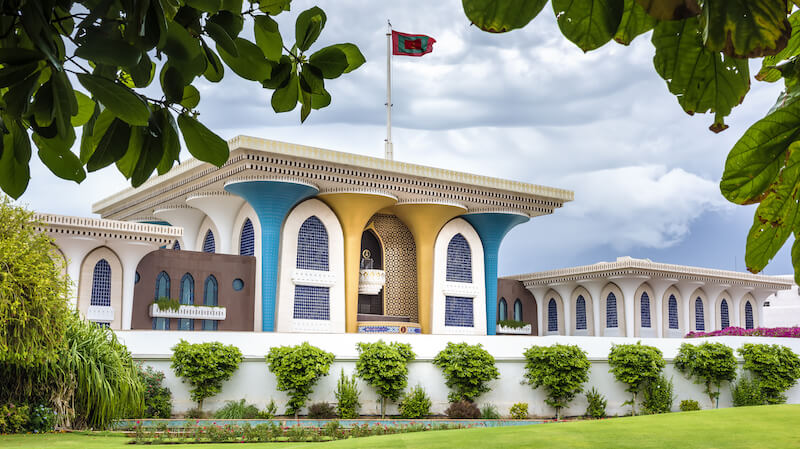

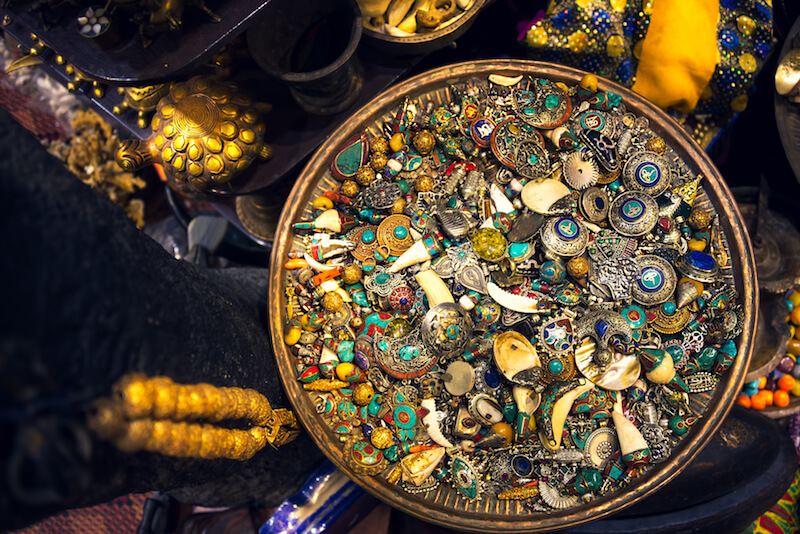

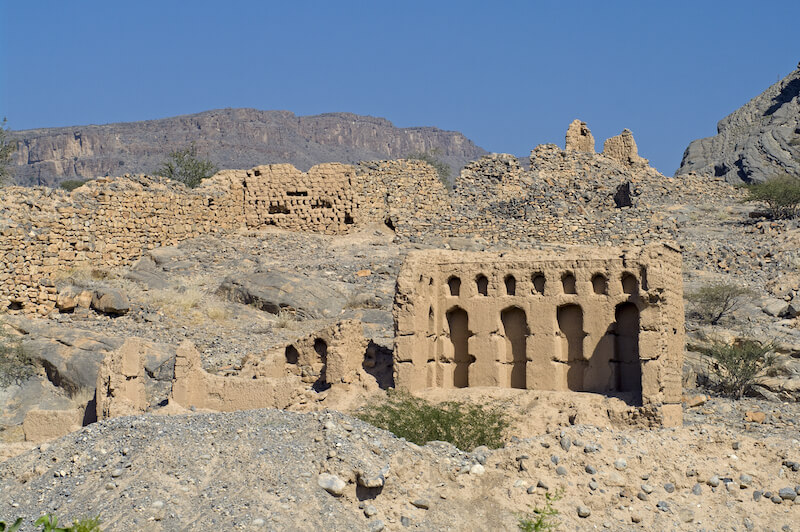

While it’s hard to get a decent cup of coffee in Oman, there are wonderful fresh fruit juices and chai (tea) is served with cream and sugar, unless you specify otherwise. No one smokes.
How to dress in Oman
The Omanis dress traditionally: the men in white dish-dashes (long “dresses” that are incredibly ALWAYS clean and well-pressed) and either kufi, the embroidered skull caps, or intricately woven head scarves. The women are completely covered in public, usually in black abeyas (long cloak-type coats) and head-scarves (hijab), with only their faces, hands and feet showing. A few cover their faces with a niqab.
The one place you do have to cover yourself completely is in a mosque. Because the Sultan Qaboos Grand Mosque is such a tourist attraction and allows non-Muslims inside at various times, I was able to purchase a full-length abeya and head scarf for under US$ 5 (in my favorite color scheme of purple and green, no less). I now pack them for other Muslim country visits.
Women and men do mix in Oman, unlike in more conservative Muslim countries, but only up to a point. Women go to school, work and hold government positions, but beneath the surface of modernity and relative liberalism there is a thick cultural layer that to me, is impenetrable.
The dynamic between the sexes is very complex and pretty much no-win for a foreign woman who may enjoy the company of an Omani man for a while, but probably will not achieve a long-term relationship. Men bond with men, and men retain the power, with women not to be seen or heard much.
Western women are free to explore and roam about on their own, especially in and around Muscat. They don’t need to cover their heads but are expected to dress modestly – no uncovered shoulders or legs, nothing low-cut. T-shirts and shorts are fine in public swimming areas, although bathing suits are fine in tourist hotels. You may be stared at, but more likely you will be the beneficiary of Omani hospitality.
ALSO READ: Is It Safe for Women to Travel to Doha?
Hospitality and friendliness in Oman
That hospitality is everywhere and people here are extraordinarily friendly. Here’s an example: I was by myself in a park, where a large family of one man, several covered women (wives? sisters?) and many children was picnicking. I was initially annoyed with how they didn’t pick up their trash, but immediately won over by their big-smile greeting, their appreciation of my limited Arabic efforts (though English is widely spoken), and their generous offer (insistence, actually) to share their food.
People are happy to take time for you in-between incessant cell phone calls and texting, which are frighteningly conducted while driving, sometimes on more than one phone!
Definitely a car culture, Oman is replete with late-model (typically white) cars and driving behavior that all too often results in head-on collisions. It has a public transport system that I couldn’t figure out, so I spent much too much money on private taxis until I discovered shared taxis, and the Oman National Transport Company whose buses leave from Ruwi (the commercial section of Muscat), and go all over the country. Having somehow missed the last bus from Nizwa, where I’d gone to see the fort and souq, I randomly hailed a taxi, dreading the fare. It turned out to be a taxi driver heading back to Muscat with his family, so he generously allowed me to squeeze into the back seat with his children for the two-hour drive, for which he charged – nothing. Of course, I gave him something for his trouble.
Everyone asks, “Where are you from?” “How long are you staying?” “How did you find Oman?” (in other words, “How do you like Oman?”) You must answer you love it. Omani hospitality can be intense to the point of inducing stress: you MUST be happy. If you’re not, they consider themselves failures as hosts, which reflects not only on them but on their friends, and families, and the whole country, and…
But that same hospitality can on occasion be almost overwhelming. I met Juma, a 28-year old young man, while visiting the Grand Mosque in Muscat. He was with a friend and with Nadia, a South African from Cape Town. Juma was so friendly, so welcoming, so big-hearted, and so generous that I accepted his invitation to go touring around Muscat with them that day. I also accepted an invitation to stay at his home, where Nadia had been staying. This was in the coastal village of Tiwi, between Muscat and the seaside resort town of Sur, where I had booked a hotel room for New Year’s Eve.
Juma offered an amazing opportunity to experience a bit of village life, go to the desert at Wahiba Sands, visit the famed Wadi Shab and Wadi Tiwi, and in Sur, see the dhow-making yard and the exquisite, traditional, elaborate wood boats that only the very wealthy can now afford. I ate local foods and joined Juma, Nadia and his many male friends at a very modest local coffee shop in Tiwi (where there is no coffee – just food, snacks, soft drinks and juices) for some lively evening entertainment.
Juma’s almost compulsive need to be a good host was driven in part by hospitality, but in equal part by self-image and by his need to be admired by his male friends.
That kind of attitude can also lead to some distressing behavior, as was the case when back in Muscat, a young man sitting with his friends insulted Nadia. I marched back and took on the whole table with my indignation, demanding to know what their mothers would think and questioning the kind of men they would grow up to be.
They probably didn’t understand a word I said, and en masse, they pulled out their cell phones and busily started texting. This was probably more of out of embarrassment than anything else, having been called out publicly by someone older, even though that person was was a woman.
Sitting in a small public square in the Muttrah section of Muscat, waiting for the souk to re-open, Nadia and I were talking about cultural differences, and how in many cultures women are supposed to cover themselves so men won’t be overcome by lust. And there we were, the only women in the square, no head covers, some bare skin, and we received no looks, no comments. No one was paying attention to us.
Well… they probably were, but were too polite and hospitable to show it.
Guest Contribution by Paulette Lee. Paulette is a retired international development communications professional and award-winning broadcast journalist from Los Angeles. An avid solo traveler who has been to more than 50 countries and lived and worked in Sub-Saharan Africa, she now lives in France. Follow Paulette’s Adventures Abroad on her blog.
OMAN TRAVEL RESOURCES
- A reliable guidebook for Oman is Lonely Planet’s UAE and Arabian Peninsula
- A number of nationalities can get an Oman visa on arrival including Canadians, Americans and Australians. Double-check before you travel because things can change quickly in the Gulf States. Conversely you can apply for a tourist visa for Oman at any consulate or embassy.
- Find the cheapest prices for hotels in Muscat with Booking.com
- If you don’t have much time, consider taking a day tour in Oman.
PIN THESE PICTURES AND SAVE FOR LATER!



